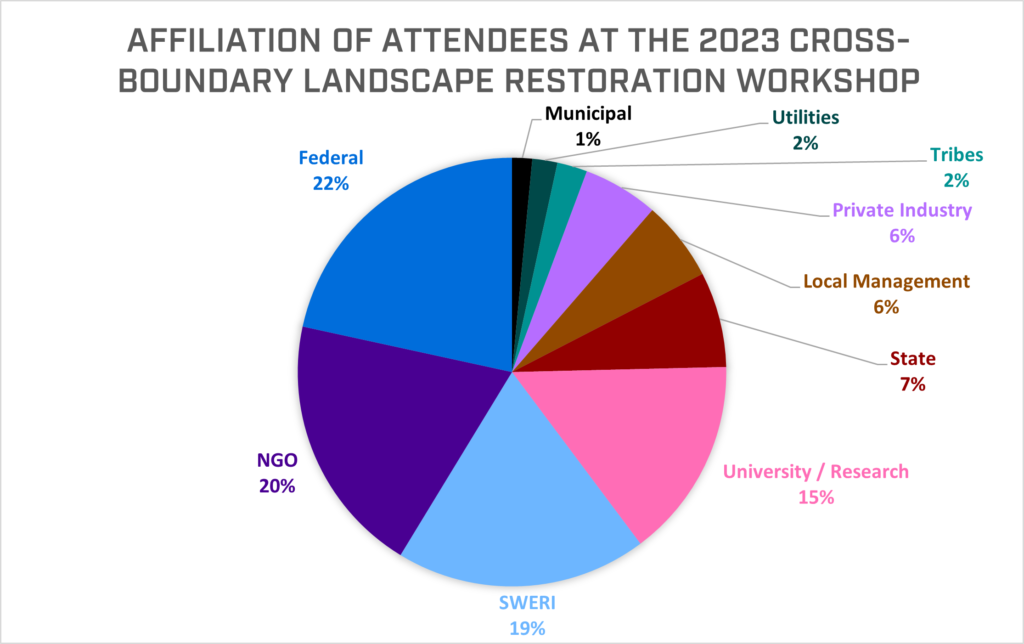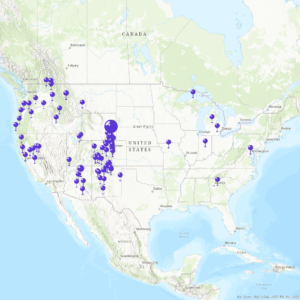
From May 2-4, 266 participants from 97 organizations across the country gathered at Colorado State University for the Cross-Boundary Landscape Restoration Workshop to explore collaborative efforts that restore and reimagine fire-adapted forest landscapes.
The Colorado Forest Restoration Institute, housed within the Department of Forest and Rangeland Stewardship of the Warner College of Natural Resources, worked with sister Southwest Ecological Restoration Institutes and many federal and non-federal co-hosts to convene the Cross-Boundary Landscape Restoration Workshop.
The week kicked off with a presentation and public discussion with Stephen Pyne, author and Arizona State University professor emeritus, who described the long history of human relationships with fire. During the three-day conference, attendees engaged in shared learning and group discussions around the theme “Adapting to a Climate-Altered West.” Practitioners, researchers, and collaborative partners recounted stories of novel challenges and successes working in fire-adapted forest landscapes; explored paradigms for more inclusive decision-making; and developed recommendations for future collaborative cross-boundary work.
Day 1
Presentations and discussions set the stage for participants to explore current biophysical, social, and political climates and challenges. Keynote speakers, Susan Prichard, fire ecologist with the University of Washington School of Environmental and Forest Sciences, and John Waconda, Indigenous Partnerships Program Director with The Nature Conservancy, shared how we can reimagine fire-adapted forests in western landscapes with place-based adaptation strategies. Participants came together in small groups to discuss emerging challenges they are facing and were given examples of successful fire management from a panel of on-the-ground fire managers. U.S. Rep. Joe Neguse wrapped up the day by expressing gratitude for the “largely unsung” work that attendees are doing every day to work towards better forest management.
Day 2
The conference focused on integrating adaptation into planning and implementation. Chris Swanston, director of the Office of Sustainability and Climate with the USDA Forest Service, spoke about responding to climate change and shared challenges around hard truths, denial, and hope. Conversations around climate change continued with lightning talks on tools for climate planning and adaptation, reforestation, and case studies of policies and climate adaptation projects in action. State foresters Tom Torres from Arizona, Matt McCombs from Colorado, and Laura McCarthy from New Mexico shared their thoughts on incorporating cross-boundary planning and implementation into fire-adapted systems and discussed barriers and opportunities for adaptation within state forestry. Participants were able to learn together with experts and peers by digging into topic-specific small-group discussions on climate adaptation, science communication, tribal-led forestry, fire management, reforestation, collaboration, and other highlighted themes throughout the day.
Day 3
Activities built a dialogue from the grass roots to the grass tops over the course of the workshop, culminating in insights from and recommendations to leadership on day three. Talks from USDA Forest Service Rocky Mountain Research Station Interim Director, Frank McCormick and Research Forester Matt Thompson, covered how science can be integrated into decision-making and outcome metrics to inform innovative strategies.
Participants had an opportunity to reflect on their takeaways from the event in a tabletop discussion where recommendations for successful cross-boundary work were developed.
The workshop concluded with panel discussions with representatives from tribal, non-governmental, local, and federal agency leadership, including national leadership representatives Joan Mooney, Principal Deputy Assistant Secretary for Policy Management and Budget with the U.S. Department of Interior and Meryl Harrell, Deputy Undersecretary for Natural Resources and Environment with the U.S. Department of Agriculture.
Workshop wrap-up

Throughout the workshop, participants and speakers returned to themes of building stronger relationships with one another, the landscapes we work in, and the processes at work on those landscapes. Adapting to rapidly changing climates while leveraging the latest science is a universal challenge among participants. However, as participants explored struggles and accomplishments, the workshop helped illuminate opportunities and resources for innovation. One panelist noted that cross-boundary landscape restoration starts with saying ‘yes’ and leaning into working together. Each individual was left with more tools and partners eager to help, and a better understanding of their unique contribution to cross-boundary landscape restoration.